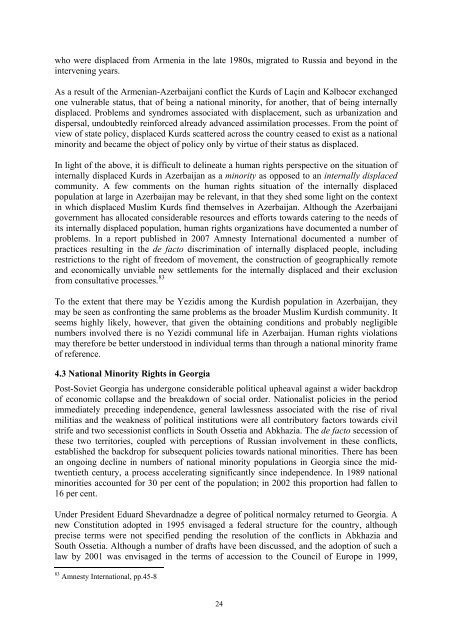The Human Rights situation of the Yezidi minority - UNHCR
The Human Rights situation of the Yezidi minority - UNHCR
The Human Rights situation of the Yezidi minority - UNHCR
You also want an ePaper? Increase the reach of your titles
YUMPU automatically turns print PDFs into web optimized ePapers that Google loves.
who were displaced from Armenia in <strong>the</strong> late 1980s, migrated to Russia and beyond in <strong>the</strong><br />
intervening years.<br />
As a result <strong>of</strong> <strong>the</strong> Armenian-Azerbaijani conflict <strong>the</strong> Kurds <strong>of</strong> Laçin and Kəlbəcər exchanged<br />
one vulnerable status, that <strong>of</strong> being a national <strong>minority</strong>, for ano<strong>the</strong>r, that <strong>of</strong> being internally<br />
displaced. Problems and syndromes associated with displacement, such as urbanization and<br />
dispersal, undoubtedly reinforced already advanced assimilation processes. From <strong>the</strong> point <strong>of</strong><br />
view <strong>of</strong> state policy, displaced Kurds scattered across <strong>the</strong> country ceased to exist as a national<br />
<strong>minority</strong> and became <strong>the</strong> object <strong>of</strong> policy only by virtue <strong>of</strong> <strong>the</strong>ir status as displaced.<br />
In light <strong>of</strong> <strong>the</strong> above, it is difficult to delineate a human rights perspective on <strong>the</strong> <strong>situation</strong> <strong>of</strong><br />
internally displaced Kurds in Azerbaijan as a <strong>minority</strong> as opposed to an internally displaced<br />
community. A few comments on <strong>the</strong> human rights <strong>situation</strong> <strong>of</strong> <strong>the</strong> internally displaced<br />
population at large in Azerbaijan may be relevant, in that <strong>the</strong>y shed some light on <strong>the</strong> context<br />
in which displaced Muslim Kurds find <strong>the</strong>mselves in Azerbaijan. Although <strong>the</strong> Azerbaijani<br />
government has allocated considerable resources and efforts towards catering to <strong>the</strong> needs <strong>of</strong><br />
its internally displaced population, human rights organizations have documented a number <strong>of</strong><br />
problems. In a report published in 2007 Amnesty International documented a number <strong>of</strong><br />
practices resulting in <strong>the</strong> de facto discrimination <strong>of</strong> internally displaced people, including<br />
restrictions to <strong>the</strong> right <strong>of</strong> freedom <strong>of</strong> movement, <strong>the</strong> construction <strong>of</strong> geographically remote<br />
and economically unviable new settlements for <strong>the</strong> internally displaced and <strong>the</strong>ir exclusion<br />
from consultative processes. 83<br />
To <strong>the</strong> extent that <strong>the</strong>re may be <strong>Yezidi</strong>s among <strong>the</strong> Kurdish population in Azerbaijan, <strong>the</strong>y<br />
may be seen as confronting <strong>the</strong> same problems as <strong>the</strong> broader Muslim Kurdish community. It<br />
seems highly likely, however, that given <strong>the</strong> obtaining conditions and probably negligible<br />
numbers involved <strong>the</strong>re is no <strong>Yezidi</strong> communal life in Azerbaijan. <strong>Human</strong> rights violations<br />
may <strong>the</strong>refore be better understood in individual terms than through a national <strong>minority</strong> frame<br />
<strong>of</strong> reference.<br />
4.3 National Minority <strong>Rights</strong> in Georgia<br />
Post-Soviet Georgia has undergone considerable political upheaval against a wider backdrop<br />
<strong>of</strong> economic collapse and <strong>the</strong> breakdown <strong>of</strong> social order. Nationalist policies in <strong>the</strong> period<br />
immediately preceding independence, general lawlessness associated with <strong>the</strong> rise <strong>of</strong> rival<br />
militias and <strong>the</strong> weakness <strong>of</strong> political institutions were all contributory factors towards civil<br />
strife and two secessionist conflicts in South Ossetia and Abkhazia. <strong>The</strong> de facto secession <strong>of</strong><br />
<strong>the</strong>se two territories, coupled with perceptions <strong>of</strong> Russian involvement in <strong>the</strong>se conflicts,<br />
established <strong>the</strong> backdrop for subsequent policies towards national minorities. <strong>The</strong>re has been<br />
an ongoing decline in numbers <strong>of</strong> national <strong>minority</strong> populations in Georgia since <strong>the</strong> midtwentieth<br />
century, a process accelerating significantly since independence. In 1989 national<br />
minorities accounted for 30 per cent <strong>of</strong> <strong>the</strong> population; in 2002 this proportion had fallen to<br />
16 per cent.<br />
Under President Eduard Shevardnadze a degree <strong>of</strong> political normalcy returned to Georgia. A<br />
new Constitution adopted in 1995 envisaged a federal structure for <strong>the</strong> country, although<br />
precise terms were not specified pending <strong>the</strong> resolution <strong>of</strong> <strong>the</strong> conflicts in Abkhazia and<br />
South Ossetia. Although a number <strong>of</strong> drafts have been discussed, and <strong>the</strong> adoption <strong>of</strong> such a<br />
law by 2001 was envisaged in <strong>the</strong> terms <strong>of</strong> accession to <strong>the</strong> Council <strong>of</strong> Europe in 1999,<br />
83 Amnesty International, pp.45-8<br />
24
















